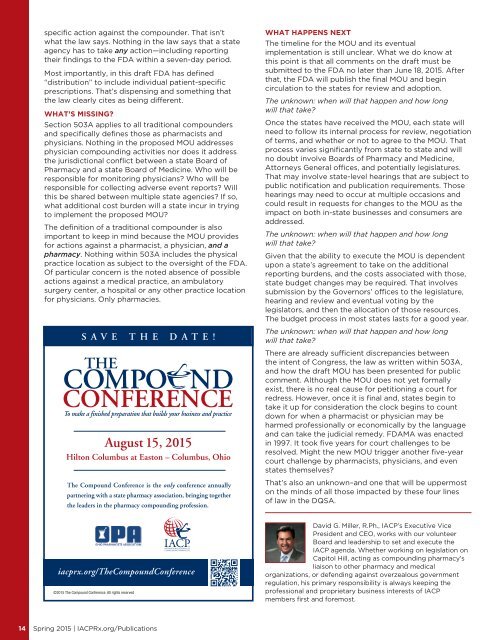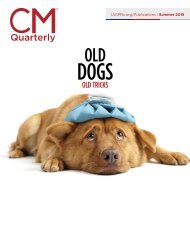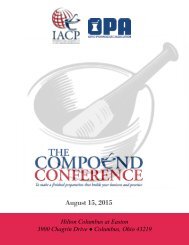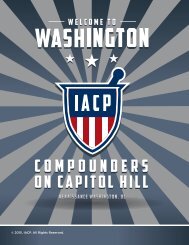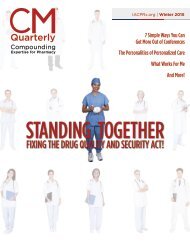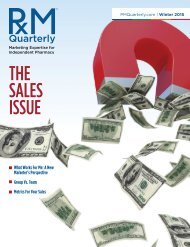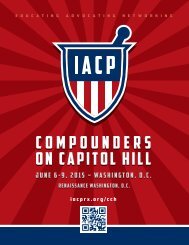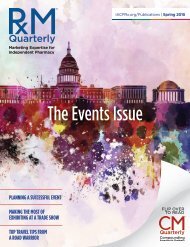Compounding Matters Quarterly - Spring 2015
Welcome to the spring issue of Compounding Matters Quarterly. In this issue: A Note From the President Six Things I Have Learned From Compounding Pharmacy Crises The Memorandum of Understanding: What It Is, What It Says, And What Happens Next The MOU -A Pharmacist's Perspective Personality of Personalized Care: Loren Madden Kirk IACP Foundation History Part 1 Save the Date For These Upcoming Programs
Welcome to the spring issue of Compounding Matters Quarterly.
In this issue:
A Note From the President
Six Things I Have Learned From Compounding Pharmacy Crises
The Memorandum of Understanding: What It Is, What It Says, And What Happens Next
The MOU -A Pharmacist's Perspective
Personality of Personalized Care: Loren Madden Kirk
IACP Foundation History Part 1
Save the Date For These Upcoming Programs
Create successful ePaper yourself
Turn your PDF publications into a flip-book with our unique Google optimized e-Paper software.
specific action against the compounder. That isn’t<br />
what the law says. Nothing in the law says that a state<br />
agency has to take any action—including reporting<br />
their findings to the FDA within a seven-day period.<br />
Most importantly, in this draft FDA has defined<br />
“distribution” to include individual patient-specific<br />
prescriptions. That’s dispensing and something that<br />
the law clearly cites as being different.<br />
WHAT’S MISSING?<br />
Section 503A applies to all traditional compounders<br />
and specifically defines those as pharmacists and<br />
physicians. Nothing in the proposed MOU addresses<br />
physician compounding activities nor does it address<br />
the jurisdictional conflict between a state Board of<br />
Pharmacy and a state Board of Medicine. Who will be<br />
responsible for monitoring physicians? Who will be<br />
responsible for collecting adverse event reports? Will<br />
this be shared between multiple state agencies? If so,<br />
what additional cost burden will a state incur in trying<br />
to implement the proposed MOU?<br />
The definition of a traditional compounder is also<br />
important to keep in mind because the MOU provides<br />
for actions against a pharmacist, a physician, and a<br />
pharmacy. Nothing within 503A includes the physical<br />
practice location as subject to the oversight of the FDA.<br />
Of particular concern is the noted absence of possible<br />
actions against a medical practice, an ambulatory<br />
surgery center, a hospital or any other practice location<br />
for physicians. Only pharmacies.<br />
CompoundConf_.25pgAD_3.625x4.75_ad_r3x_Layout 1 11/18/14 5:52 PM Page<br />
SAVE<br />
THE DATE!<br />
August15, <strong>2015</strong><br />
Hilton Columbus at Easton – Columbus, Ohio<br />
The Compound Conference is the only conference annually<br />
partnering with a state pharmacy association, bringing together<br />
the leaders in the pharmacy compounding profession.<br />
WHAT HAPPENS NEXT<br />
The timeline for the MOU and its eventual<br />
implementation is still unclear. What we do know at<br />
this point is that all comments on the draft must be<br />
submitted to the FDA no later than June 18, <strong>2015</strong>. After<br />
that, the FDA will publish the final MOU and begin<br />
circulation to the states for review and adoption.<br />
The unknown: when will that happen and how long<br />
will that take?<br />
Once the states have received the MOU, each state will<br />
need to follow its internal process for review, negotiation<br />
of terms, and whether or not to agree to the MOU. That<br />
process varies significantly from state to state and will<br />
no doubt involve Boards of Pharmacy and Medicine,<br />
Attorneys General offices, and potentially legislatures.<br />
That may involve state-level hearings that are subject to<br />
public notification and publication requirements. Those<br />
hearings may need to occur at multiple occasions and<br />
could result in requests for changes to the MOU as the<br />
impact on both in-state businesses and consumers are<br />
addressed.<br />
The unknown: when will that happen and how long<br />
will that take?<br />
Given that the ability to execute the MOU is dependent<br />
upon a state’s agreement to take on the additional<br />
reporting burdens, and the costs associated with those,<br />
state budget changes may be required. That involves<br />
submission by the Governors’ offices to the legislature,<br />
hearing and review and eventual voting by the<br />
legislators, and then the allocation of those resources.<br />
The budget process in most states lasts for a good year.<br />
The unknown: when will that happen and how long<br />
will that take?<br />
There are already sufficient discrepancies between<br />
the intent of Congress, the law as written within 503A,<br />
and how the draft MOU has been presented for public<br />
comment. Although the MOU does not yet formally<br />
exist, there is no real cause for petitioning a court for<br />
redress. However, once it is final and, states begin to<br />
take it up for consideration the clock begins to count<br />
down for when a pharmacist or physician may be<br />
harmed professionally or economically by the language<br />
and can take the judicial remedy. FDAMA was enacted<br />
in 1997. It took five years for court challenges to be<br />
resolved. Might the new MOU trigger another five-year<br />
court challenge by pharmacists, physicians, and even<br />
states themselves?<br />
That’s also an unknown–and one that will be uppermost<br />
on the minds of all those impacted by these four lines<br />
of law in the DQSA.<br />
iacprx.org/TheCompoundConference<br />
©<strong>2015</strong> The Compound Conference. All rights reserved<br />
106.14.158 IACP Compound Conference –.25 Page 4/c (3.625 x 4.75”) –IJPC • bertsDesign 713.825.5002<br />
David G. Miller, R.Ph., IACP’s Executive Vice<br />
President and CEO, works with our volunteer<br />
Board and leadership to set and execute the<br />
IACP agenda. Whether working on legislation on<br />
Capitol Hill, acting as compounding pharmacy’s<br />
liaison to other pharmacy and medical<br />
organizations, or defending against overzealous government<br />
regulation, his primary responsibility is always keeping the<br />
professional and proprietary business interests of IACP<br />
members first and foremost.<br />
14 <strong>Spring</strong> <strong>2015</strong> | IACPRx.org/Publications


